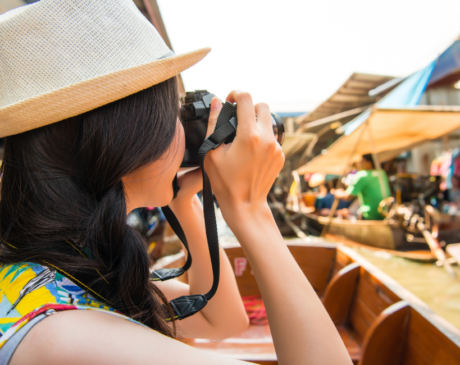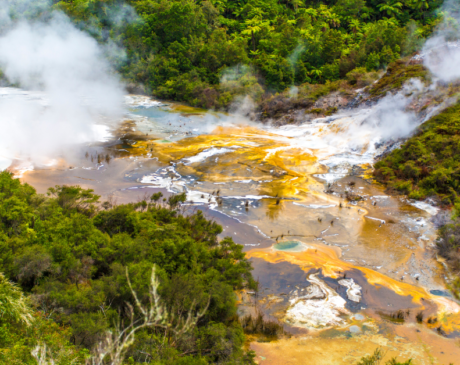Sustainable Lifestyle Empowering Eco-Action: Conversation with Jessica Kleczka
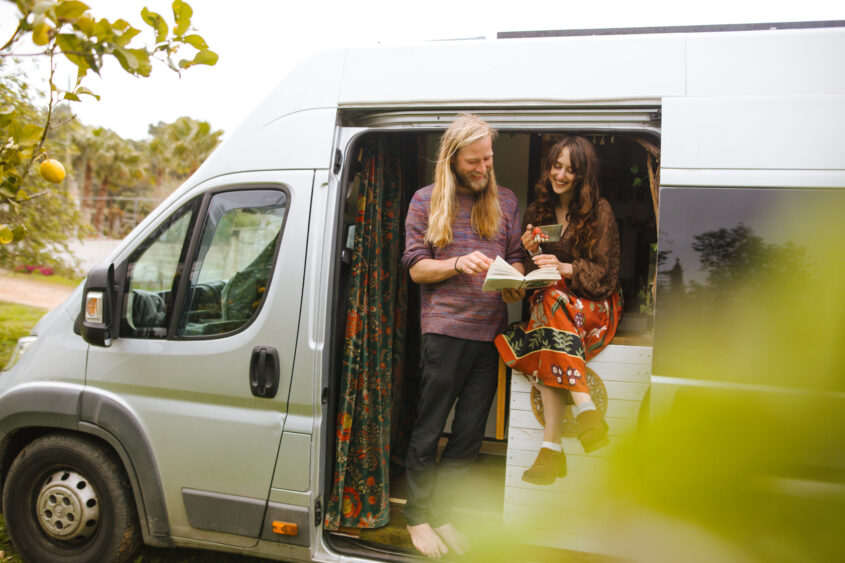
Embark with us on an inspiring journey with Jessica Kleczka, climate psychologist, activist and advocate for an environmentally sustainable lifestyle; in this interview: “Sustainable Lifestyle Empowering Eco-Action: Conversation with Jessica Kleczka”, Jessica reveals her evolution from being born in polluted urban environments, to fostering a deep connection with nature, to embracing a minimalist, sustainable lifestyle on wheels.
Jessica tells us about her upbringing amidst environmental challenges, which ignited her fervor for preserving green spaces and advocating for environmental causes.
From adopting a plant-based diet to a fervent commitment to environmental activism during her college years, Jessica recounts her gradual transition to a sustainable lifestyle.
As a climate psychologist and committed activist, Jessica sheds light on her professional trajectory, which includes studying psychology, specializing in climate change, and actively participating in impactful campaigns fighting the climate crisis.
Venturing into her unique lifestyle, she offers a glimpse into her off-grid “cottage on wheels.”
Sharing the joys and challenges of living sustainably in a self-sufficient campervan, powered by solar energy and devoid of public utilities, she navigates the intricacies of remote work and intentional online connectivity amidst her nomadic pursuits.
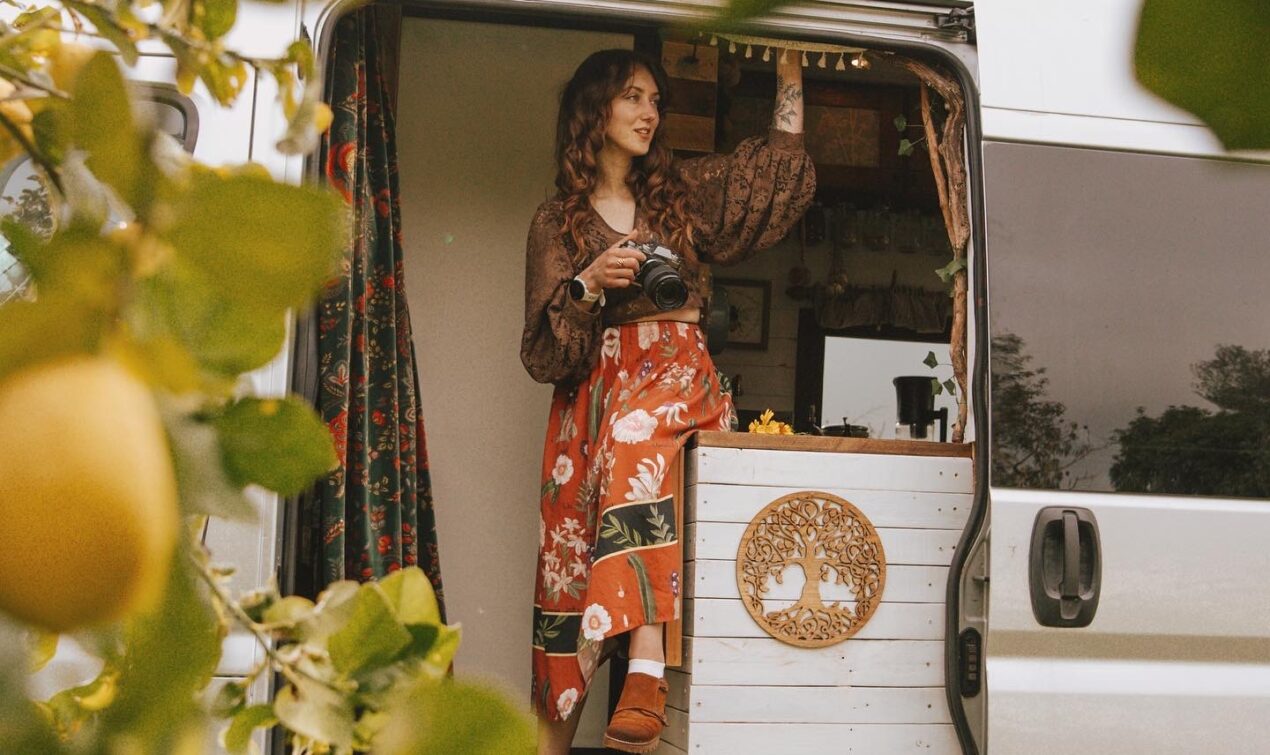
Tell us a bit about you, your life and what led you to make this eco sustainable lifestyle choice!
I grew up in some of the most polluted areas of Europe but always had a close relationship with the natural world.
After moving to London for university I grew quite disconnected from nature, which affected my mental health considerably.
First I channelled my care into environmental activism, and then realised that my well-being deeply depended on the environments around me.
I first moved to the countryside in Wales, where I met my partner, and when the cost-of-living crisis hit we thought this would be a great time to give van life a go!
I’ve been on a journey towards minimalism and sustainable living for quite a few years now – although that wasn’t always my key motivator!
My first step was to switch to a plant-based diet for health reasons, and I started buying second-hand to save money as a student.
When I realised the extent of the climate crisis and other environmental issues, I became an activist and started making an active effort to live as sustainably as possible.
I’ve always loved the idea of living in a tiny space whilst travelling and experiencing new things, so van life fits the bill perfectly!
How did your interest in these climate and eco sustainable issues come about?
I grew up on the edge of a polluted city, but our housing estate was surrounded by wetlands, where I spent many happy hours exploring and playing with my friends.
As I grew older, more housing was built for the growing working population and my beloved wetlands were destroyed. This had quite a big impact on me and I’m now a big advocate for safeguarding green spaces in cities, as well as spending time in nature as mental health care.
My journey as an activist happened quite gradually – in my early twenties I adopted a plant-based diet for health reasons and started learning more about how our over-consumption negatively affects all life on earth.
I grew up very disenfranchised with politics and became a campaigner during my undergraduate.
I firmly believe that building a better future needs primarily system-level change – making it easier for all of us to live sustainably – but I’ve also always been committed to living with as low of an impact as possible.
So shopping second-hand, buying plastic-free whenever possible, eating local and seasonal produce and opting for active travel are all things I’ve been passionate about for a long time.
You are a climate psychologist and a campaigner; what path did you follow to pursue this profession and what does it consist of?
I became an environmental activist during my undergraduate studying Psychology.
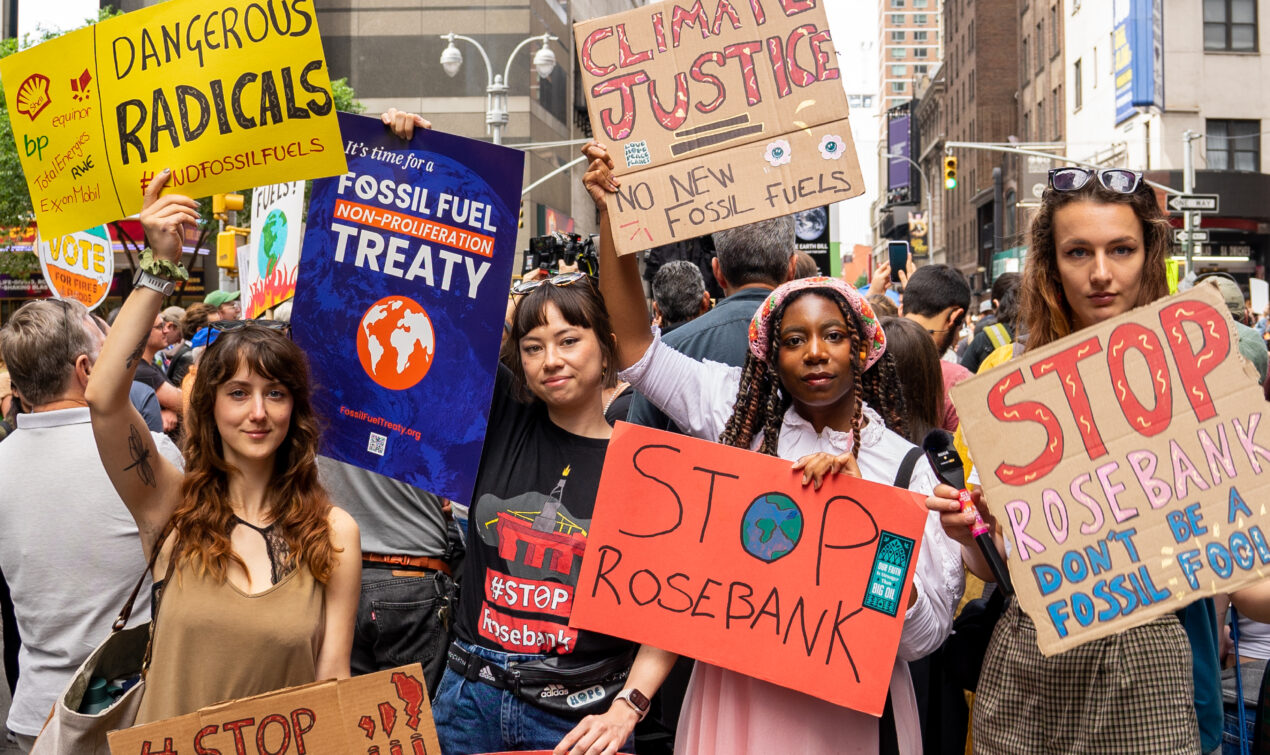
During that time I was struggling a lot with burnout, juggling my degree, campaigning and a part-time job.
I wanted to find a profession that would allow me to combine my love for psychology and my care for the planet – luckily, my university supervisors gave me a lot of flexibility and allowed me to focus on climate psychology during my last year. I then went on to study for a Master’s degree in climate change to deepen my understanding of environmental science and worked in climate policy for nine months before starting to work as a freelance researcher and consultant.
My research focus is on eco-anxiety and effective climate communication – last year, I worked on a big paper titled “A new era in climate communications”, which opened my eyes to the fact that creativity is an essential tool for engaging people with climate issues.
So I’ve been leaning more into that side of my work recently.
In my campaigning work, I focus on stopping new fossil fuel developments as polluting fuels are the main driver of climate change – I’m part of the Stop Rosebank coalition, working to stop the biggest undeveloped oil field in the North Sea.
Activism can be hard work, but it’s also incredibly rewarding – I was part of campaigns to pressure the UK government into declaring a climate emergency, stopping a coal mine expansion in England, halting the huge Cambo oil field, and recently putting a pause to fossil gas expansion in the United States.
Campaigning is one of the most powerful ways to affect policy change, which is why I’ve always been involved in activism alongside my academic work.
You live and travel in an off grid “cottage on wheels” right? What does that mean? Tell us more!
My partner and I converted our campervan “Bilbo” over the course of five months last year.
We call him our ‘cottage on wheels’ because of his rustic feel, it often doesn’t feel like being in a vehicle at all!
Being off-grid means that you don’t depend on public utilities. We have a big solar panel, powerful battery and a big water tank under our van which allows us to spend six days a week in nature and one day doing a town run.
We decided not to have gas in our van, both for sustainability and health reasons, so we spend winters in southern Europe and summers in the North to accommodate that.
My partner and I both work remotely, and we have a satellite dish which allows us to connect to the internet anywhere.
We’re often in places where we don’t have signal, which makes being online an intentional choice – something we didn’t anticipate but enjoy a lot!
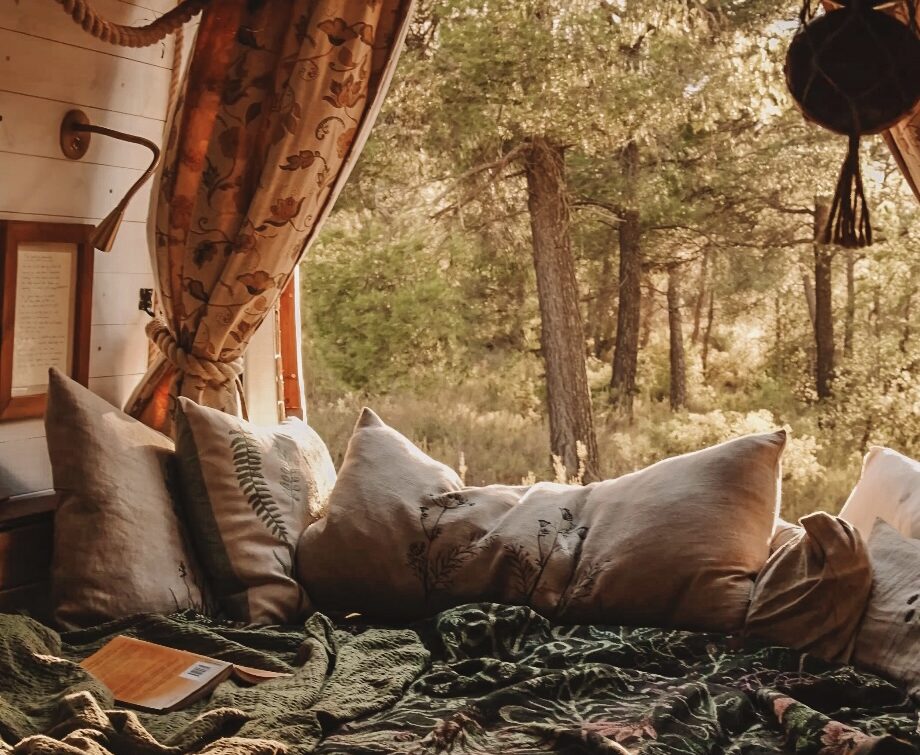
Why is it worth living in an off grid van and what principles are these houses based on?
There are a number of things we have done to make our van conversion as sustainable as possible.
The vehicle itself was bought second-hand and is compatible with ultra-low emission zones.
We used quite a bit of scrap wood for the basic structures of our conversion which would otherwise have gone to waste, and we used the subfloor and other materials our van already came with when we bought it.
We chose hemp for our insulation as it’s a more sustainable alternative and a superior insulation material.
We used reclaimed cladding and countertops, and our mattress is from a sustainable company, made with coconut fibre and other organic materials.
We used eco-friendly paints and non-toxic wood oil, and where sustainable options weren’t available – mostly for our shower – we opted for lightweight materials to save on fuel.
Have there been any significant changes in your life as a result of this life choice?
The biggest shift was monitoring our electricity and water usage.
It makes you really aware of how irresponsibly most of us use the earth’s finite resources – before we had no idea how much any of our devices used, and it took us a few weeks to get to the point where we wouldn’t drain our battery in a couple of days.
We have to plan around cloudy days as we don’t use gas, and be careful with our water.
Once we were used to it we loved living in a natural equilibrium, and we wouldn’t have it any other way.
Maintaining a van isn’t that different from a small apartment – a few things take longer, such as washing our laundry by hand and making the bed.
Other things, such as cleaning or hoovering, are very quick.
The way we eat hasn’t changed a huge amount either, but our diets have become a lot healthier – because we have limited storage space there are fewer temptations for unhealthy choices, and because we usually only cook once a day or every two days, we’re very intentional about what we put into our bodies.
We buy almost exclusively local and seasonal produce and compost our food scraps. We also hold onto the rest of our recycling and sort it whenever we go on a town run.
This can be inconvenient sometimes as we only have a small bin, but it does motivate us to buy as few products in plastic packaging as possible!
What eco-sustainable issues do you care most about and what campaigns have you supported and would like to support to spread the word?
Apart from my campaigning work to stop new fossil fuel developments, I’m very passionate about rewilding and nature restoration projects – which is why I started Road to the Future, a project documenting environmental initiatives around Europe together with Earthly Explore.
When we moved into the van, I was thinking about how we could best give back to the communities we visit, and using my social media platform to amplify the incredible work that is happening seemed like a lot of fun.
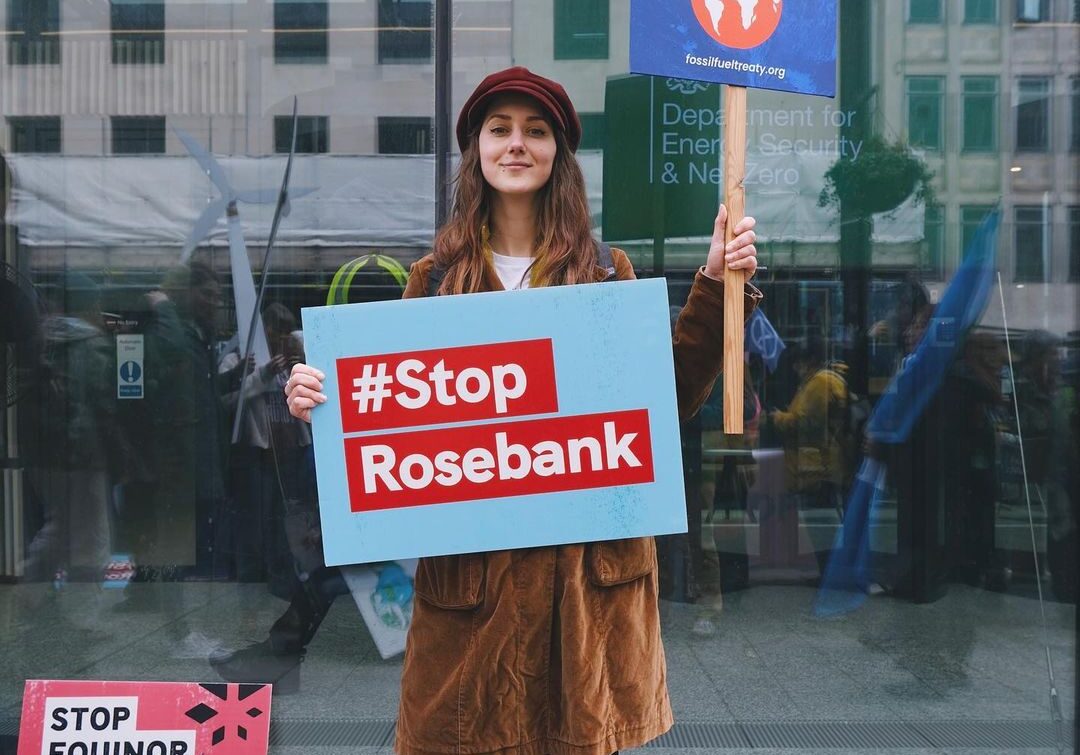
So far this project has led us to a community in southern Spain restoring a drought-stricken valley, an underwater forest restoration project in Mallorca, and Europe’s largest Buddhist monastery.
Later this year, we’re hoping to continue this journey towards Scandinavia and Eastern Europe.
Can you tell us a funny anecdote that has happened to you since living in an off grid and sustainable cottage?
When we started converting our van last July, we were hoping to get it all done by September – little did we know that everything typically takes three times as long as planned!
When we finally finished our conversion it was January, and we spent our first few weeks of van life in the UK while we were getting ready to travel to Europe.
Winters in the UK are very gloomy, and our solar panel was generating so little electricity even on sunny days, that we thought it was broken at first!
We contacted the company and retailer we bought it from who were very helpful, but once we reached Spain we were getting lots of solar and realised we had made complete fools of ourselves.
What advice would you like to give to a family or someone who would like to take a similar journey and embark on this lifestyle?
Start decluttering early! I sorted through my possessions over a year and it was quite an emotional journey.
Funnily enough, I used to be a hoarder – I had a huge wardrobe of second-hand finds and hundreds of books.
My partner and I moved into a small apartment together which helped the process, and to this day I’m giving away the odd thing as soon as I realise I don’t use it enough to justify keeping it.
But my biggest advice would be to just go for it – this lifestyle has always been my dream, making it a reality was hard work but it was so worth it.
Thank you so much, Jessica!
If you want to follow her adventures, you can find the link here: @jessicakleczka: https://www.instagram.com/jessicakleczka/
In the wake of Jessica Kleczka’s journey, we’re reminded of the power of individual action in shaping a more sustainable lifestyle and future.
Her story illuminates the transformative potential within each of us to forge meaningful connections with our environment and enact positive change.
As we bid farewell to this enlightening conversation, Jessica’s unwavering dedication to eco-sustainability serves as a beacon of hope and inspiration.
Let us carry forward her ethos of mindfulness, activism, and resilience as we embark on our own paths toward a greener, more eco-conscious world!
Let us know in the comments if you enjoyed our article “Sustainable Lifestyle Empowering Eco-Action: Conversation with Jessica Kleczka”.


